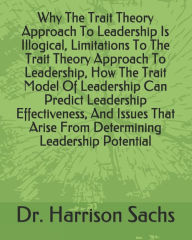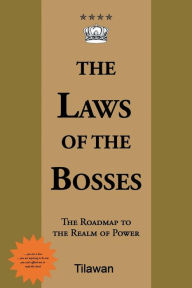Why The Trait Theory Approach To Leadership Is Illogical, Limitations To The Trait Theory Approach To Leadership, How The Trait Model Of Leadership Ca
by Dr. Harrison Sachs
2020-05-29 16:08:46
Why The Trait Theory Approach To Leadership Is Illogical, Limitations To The Trait Theory Approach To Leadership, How The Trait Model Of Leadership Ca
by Dr. Harrison Sachs
2020-05-29 16:08:46
This essay sheds light on why the trait theory approach to leadership is deemed illogical, identifies the limitations to the trait theory approach to leadership, and elucidates how the trait model of leadership can predict leadership effectiveness. A...
Read more
This essay sheds light on why the trait theory approach to leadership is deemed illogical, identifies the limitations to the trait theory approach to leadership, and elucidates how the trait model of leadership can predict leadership effectiveness. Additionally issues that arise from determining leadership potential based on the trait theory approach to leadership and how leaders are developed from a young age are delineated in this essay. The essence of the philosophy appertaining to the the trait theory approach to leadership states that leaders are born and are not made. The traits approach gives rise to questions: whether leaders are born or made; and whether leadership is an art or science. Leadership may be something of an art; it still requires the application of special skills and techniques. Even if there are certain inborn qualities that make one a good leader, these natural talents need encouragement and development (Trait theory of,). An individual is not born with all leadership qualities, such as self-confidence. Self-confidence is developed, honesty and integrity are also a matter of personal choice, motivation to lead comes from within the individual, and the knowledge of business can be acquired. While cognitive ability has its origin partly in genes, it still needs to be developed (Trait theory of,) and cultivated overtime. It is arguably eminently illogical to believe that leaders are born and not profusely developed overtime since leadership traits, leadership skill sets, and leadership qualities are not acquired overnight from conception. Some of the ample limitations subsumed under the trait theory approach to leadership encompass subjective judgment in determining who is regarded as a 'good' or 'successful' leader, the broad list of possible leadership traits tends to be extremely long at over more than 100 different traits which can be generalities, disagreement over which traits are the most important for an effective leader, the complexity of the theory, and the model attempts to relate physical traits such as, height and weight, to effective leadership (Trait theory of,). In regards to its application, the trait model of leadership is based on the characteristics of many leaders - both successful and unsuccessful - and is used to predict leadership effectiveness. The resulting lists of traits are then compared to those of potential leaders to assess their likelihood of success or failure (Trait theory of,). Ample issues that arise from determining a potential leader based off the trait approach to leadership, such as choosing a leader based off age and physical characteristics, that do not denote how prepared a leader candidate is to efficaciously handle a leadership role in an organizational setting. Ultimately, one can conclude that leaders are created overtime by witnessing valuable leadership related experiences and by gaining leadership knowledge instead of automatically being born a leader.
Less






























